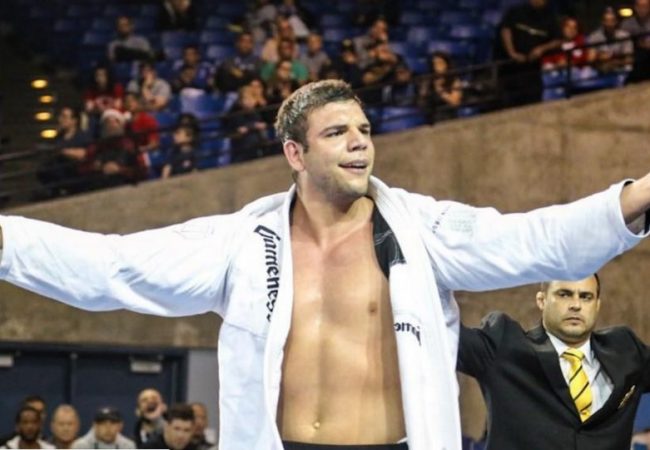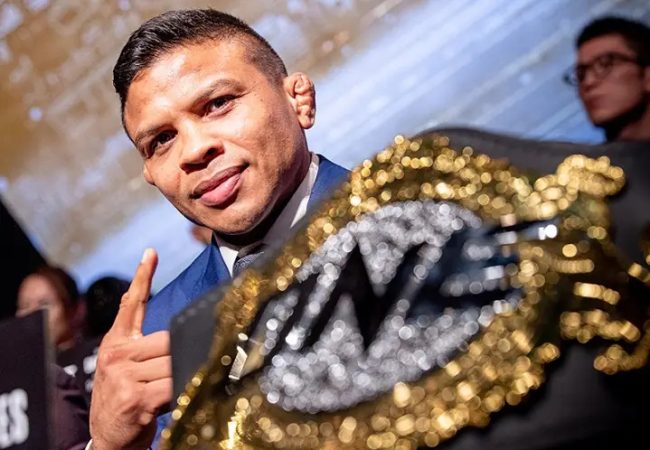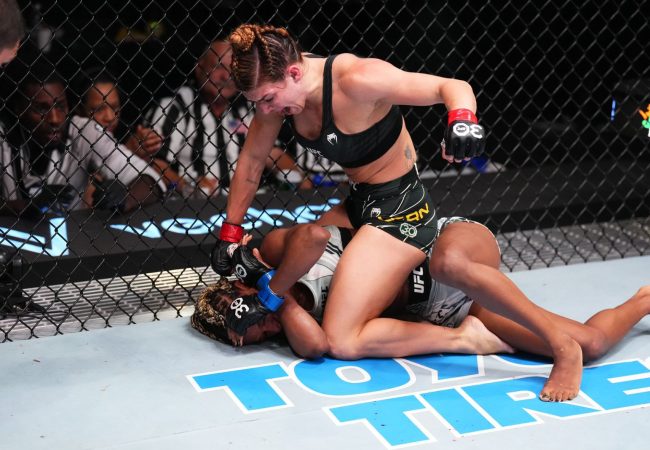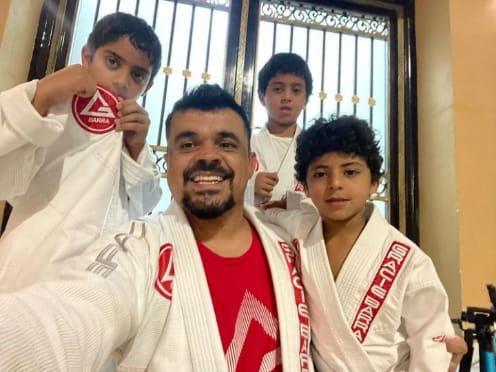
Ronny and his young students. Photo: Reproduction
A teacher at GB West Bay Doha, in Qatar, Ronny Carvalho is well acquainted with the challenges of an athlete’s life, always looking for titles in Jiu-Jitsu. With that in mind, the black belt opened his chest of stories to GRACIEMAG and told about his path through the gentle art, his focus on training, and the qualities needed to win the dream gold in competitions. Check the lines below!
GRACIEMAG: What was your first contact with Jiu-Jitsu?
RONNY CARVALHO: I’m from Formiga, a city in Minas Gerais that generated big names in Jiu-Jitsu like Rodrigo Ranieri, Marcelo Garcia and Matheus Diniz. It was through Ranieri that Jiu-Jitsu began to gain strength in Formiga and it was because of him that I got to know the sport. At the time, I was 14 years old and I fell in love quickly. A short time later, I met master Paulão Rezende, who taught Jiu-Jitsu to Ranieri. He lived in Poços de Caldas, which is a neighboring city, and was responsible for polishing this generation of athletes who left Formiga. We left our hometown and went to live there to train with Paulão.
How were your first years in Jiu-Jitsu?
Moving to Poços de Caldas was a big change in my life. The city was already famous in Jiu-Jitsu because Marcelinho Garcia had won the Worlds at blue belt and because of other athletes who left there and left their mark on the sport. When I arrived in the city, I started to have a different view of Jiu-Jitsu and decided that I wanted to make a living from it, but I understood that for that I would need to adapt to Paulão’s training system, which was very tough. Not to mention that the championships were held monthly and everyone competed, encouraged by Paulão. Sometimes we didn’t even have money to travel, but we got together and went in the race to participate in competitions. It was a time full of ups and downs, but it was also a great experience and a very good time in my life. Despite being at Gracie Barra today, together with Bráulio Estima, to whom I am very grateful, I maintain my respect and admiration for Paulão, who taught me everything I know about Jiu-Jitsu.
Eventually you left Minas Gerais and stayed in Brasília, under the tutelage of Professor João Roque. What motivated this change?
Despite living in Poços de Caldas, I often needed to leave the state because of work and, on these occasions, I looked for other gyms to train. When I went to Brasília, I looked for João Roque on the advice of my master and I adapted well to his style. João is an incredible master and I started to consider him and the people there as my second family in Jiu-Jitsu. I kept competing monthly and I was impressed with the athletes there, all very tough. After a year and a few titles won in Brasília, João Roque graduated me to brown belt.
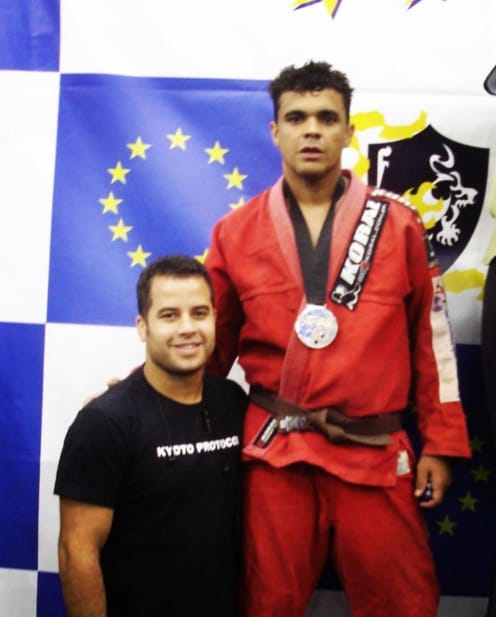
Ronny e the silver medal acquired at the IBJJF European 2008. Photo: Reproduction
What are the most memorable memories of your graduation to black belt?
I was graduated to black belt at the end of 2008, at the hands of Professor Reinaldo Ribeiro. Shortly after receiving the brown, Bernardo Pitel, who was a student of João Roque, asked me to go with him to compete in the European Championship. I was runner-up in the Master 1 category and decided to stay there, training with Reinaldo. I was raised with him in Jiu-Jitsu, we were on the same team. I felt very honored to receive the black from his hands, a guy who demanded a lot and taught me even more about Jiu-Jitsu. I debuted my black belt the following year and reached third place at the 2009 IBJJF European.
Teaching is an aspect of Jiu-Jitsu that is increasingly sought after by practitioners, regardless of age. In your opinion, is it possible to balance the life of an athlete and that of a teacher?
I think it’s important to stay focused on our goals. If the athlete seeks to be a champion, regardless of being state, national, or world, he needs to keep this focus. The path to reach this level is not easy, there are many challenges and difficulties. Preparing a student who lives with a competitive mindset to be a teacher, especially if they’re young, is something I’m not in favor of. I prefer to work on this athlete’s psychology so that he doesn’t miss his objective, always keeping in mind the things he needs to do to reach this goal, such as training a lot, eating well, and sleeping early.
What training is always a part of one of your classes?
I always use one of the training techniques I learned from Paulão Rezende, in my early days back in Poços de Caldas. I have the students do three minutes of guarding and then, still in the same pair, another three minutes of guard passing. I divide this training into four rounds, with the first two allowing submission, and in the last ones, we only keep the pass. As the goal is for the student to be able to pass the guard quickly, we have a margin of thirty seconds to complete a sweep. This greatly increases the athlete’s level in competitions.
What are the key elements for an athlete to become a champion?
In the physical part, I believe that a champion needs to have at least six hours of Jiu-Jitsu training a day. These hours can be spread over several sessions in the day, but the athlete needs to formulate a strategy and practice a lot. The champion’s game must consist of, at most, four positions that he will use in fights, that is, keep the training focus on what he already knows how to do. A takedown that he can do well or a sweep that he is used to, are movements that should be part of this athlete’s game and should be the priority in training.
On the psychological side, in my view, it is a joint effort between the teacher and the athlete. On the one hand, the athlete needs to have the discipline and dedication to reach the high level necessary to become a champion. Drinking alcoholic beverages, or even soft sugary drinks, and sleeping late is not part of the life of a professional athlete. On the other hand, the teacher needs to know how to manage the psychology of this student, without going overboard. In addition to physical fitness, a champion needs to be mentally shielded to put aside the difficulties of life on and off the mat and successfully execute his strategy in the competition.



